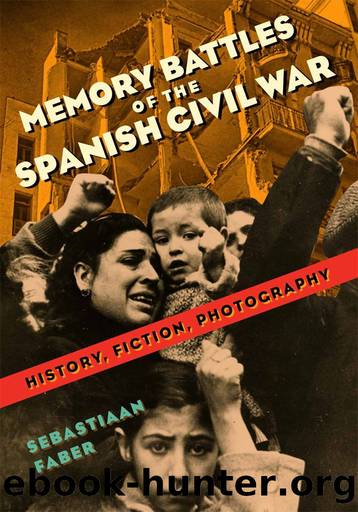Memory Battles of the Spanish Civil War: History, Fiction, Photography by Sebastiaan Faber

Author:Sebastiaan Faber [Faber, Sebastiaan]
Language: eng
Format: epub
Tags: Spain & Portugal, Europe, Modern, 20th Century, Political Science, History, Human Rights
ISBN: 9780826504050
Google: a7wpEAAAQBAJ
Goodreads: 34409290
Publisher: Vanderbilt University Press
Published: 2018-01-31T00:00:00+00:00
8
An Epidemic of Mediocrity
Spain According to Gregorio Morán
GREGORIO MORÃN IS A PAIN IN THE NECK. Heâs the child who embarrasses his parents by observing truths that polite society prefers to leave unmentioned (âDaddy, why is that man so ugly?â). It is no surprise that CrÃtica, an imprint owned by the conglomerate that includes the publishing company Planeta, tried to censor El cura y los mandarines (The priest and the mandarins), Moránâs no-holds-barred account of more than thirty years of Spanish culture, covering the last decades of the Franco regime and the first of post-Franco democracy. Nor is it surprising that Morán refused to budge. Reportedly, the stumbling block was a short chapter in which Morán targeted Spainâs Royal Academy of Languageâparticularly its former director, the literary scholar VÃctor GarcÃa de la Concha, whom he characterized as a careerist of limited intellectual abilities. (CrÃtica: âGregorio, donât be rude. Please apologize to Mr. GarcÃa de la Concha.â Gregorio: âI donât want to! He deserves it!â) When CrÃticaâs failed attempt to have the chapter cut became public in late 2014, Morán branded the publisherâs pressure as a form of financial rather than political censorship. The conglomerate called off the project, he said, because it was not willing to risk its profitable partnership with the Royal Academy that allows it to publish the Academyâs best-selling dictionary. The scandal helped generate publicity for Moránâs book, which finally came out with Akal (2014). But, even without the public quarrel, the book would have made plenty of noise. Moránâs monumental account is impossible to ignoreâalthough some have certainly attempted to wish it away, as the novelist Juan Goytisolo (2015) pointed out in an op-ed for El PaÃs. El cura y los mandarines takes us on a journey through thirty-four years of Spanish culture, from the landmark 1962 until 1996, which signaled the end of a decade and a half of Socialist rule. The panorama is nothing short of devastating. It is very hard indeed to imagine the emperor properly dressed after eight hundred pages of grotesque and ridiculous nakedness.
Morán (born in Oviedo in 1947) is an anomaly in Spain: a fiercely independent journalist. As a student in Madrid he joined the Communist Party (PCE) and was active in the anti-Franco opposition. After spending several years exiled in Paris, where he wrote for the Partyâs paper, Mundo Obrero, he returned to Spain, left the PCE, and joined the young weekly Cambio 16. While making a name for himself as a ruthlessly muckraking reporter, he also embarked on a career as a political and cultural historian. In 1979, he published a biography of then prime minister Adolfo Suárez; among his other books are a critical history of the Spanish Communist Party since the end of the Civil War (1986); a demythologizing history of the Transition (1991) that prefigured the later, critical reading of the period; and an unforgiving biography of the philosopher José Ortega y Gasset (1998). Since the 1980s, heâs provided biting commentary on current events in a weekly column in the Barcelona newspaper La Vanguardia.
Download
This site does not store any files on its server. We only index and link to content provided by other sites. Please contact the content providers to delete copyright contents if any and email us, we'll remove relevant links or contents immediately.
The World Almanac and Book of Facts 2021 by Sarah Janssen(878)
The emperor wears no clothes by Jack Herer(383)
The Way Home by Unknown(349)
The Crises of Civilization by Dipesh Chakrabarty(326)
History of India: A History In 50 Events by Hourly History(290)
Darius in the Shadow of Alexander by Pierre Briant(284)
Hidden Links by Zac Sangeeth & Sangeeth Varghese(270)
A Military History of the Cold War, 1962â1991 by Jonathan M. House(265)
The History of Human Marriage by Edward Westermarck(264)
Prehistoric Europe by Champion Timothy. Whittle Alasdair. Shennan Stephen. Gamble Clive(255)
Flood Legends: Global Clues of a Common Event by Charles Martin(251)
History of the Jews: An Enthralling Guide from Ancient Times to the Present (Religion in Past Times) by Wellman Billy(238)
Chinese History: 500 Interesting Facts About China (Curious Histories Collection) by Ahoy Publications(225)
Big Tent by Mallory Factor(214)
The Education of Historians for Twenty-First Century by Thomas Bender; Philip F. Katz; Colin A. Palmer(212)
Mark Of The Scots - Cl by Duncan A. Bruce(203)
The Philosophy of Historiography by John Lange(202)
Other Pasts, Different Presents, Alternative Futures by Jeremy Black(201)
Ancient Roman Sports, A-Z : Athletes, Venues, Events and Terms by David Matz(195)
